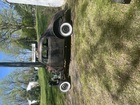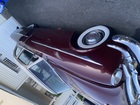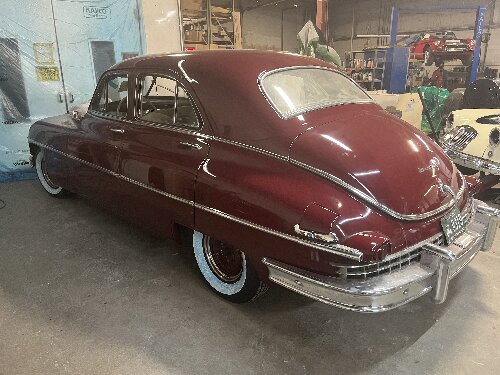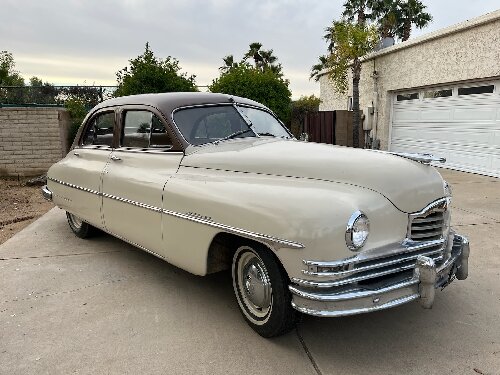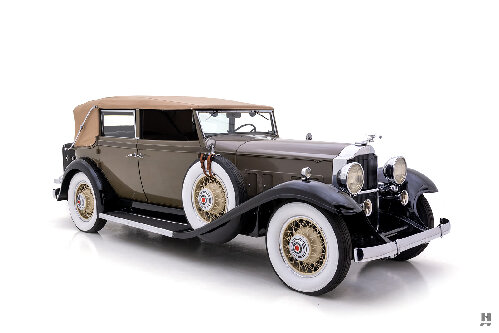|
Re: Engine overheating
|
||||
|---|---|---|---|---|
|
Webmaster
|
How is the water distribution tube? Is it clogged or missing. Also check that the water pump clearance is correct. Too large of a gap and it could be subject to cavitation, and not moving enough water.
The next would be the flow rate of radiator. Even though it was fitted with a new core, if the new core was as thick or efficient as the old one, then it wouldn't have the same cooling capacity. How's the timing? If too advanced then that can cause overheating. How's the exhaust? A partially clogged exhaust can also cause overheating. Are you sure the heater valve is closing? Is not it can recycle hot water back into the motor. Lastly a bad head gasket, cracked block, or warped head can cause hot cylinder gasses to leak into the coolant which overheats it. Good luck!
Posted on: 2023/7/30 16:22
|
|||
|
-BigKev
1954 Packard Clipper Deluxe Touring Sedan -> Registry | Project Blog 1937 Packard 115-C Convertible Coupe -> Registry | Project Blog |
||||
|
||||
|
Re: Engine overheating
|
||||
|---|---|---|---|---|
|
Home away from home
|
Usually, ignition timing that is not advanced enough will cause overheating. Also check the distributor vacuum chamber to make sure it is working. A vacuum leak here will also lead to overheating plus poor performance.
Posted on: 2023/7/31 13:53
|
|||
|
We move toward
And make happen What occupies our mind... (W. Scherer) |
||||
|
||||
|
Re: Engine overheating
|
||||
|---|---|---|---|---|
|
Home away from home
|
what "cooling system sealer" did you use?
If that stuff gets in the radiator and sets, your probably fouled and need cleaned out and the block too! Don't expect to run with a cracked block* and loose head gasket bolts very long as the bypass will enter the cooling system and foul that too. Could be your getting hot gases in now and that's causing the temperature gauge to read high. Put a thermal camera/digital pyrometer on the radiator and compare to the gauge. You need to maintain pressure when you go in the mountains, and these old radiators only kept about 7 psi caps so may not be enough for high altitude. They often sold "special" cars for high altitude environs. Water boils lower at reduced pressure with altitude. You have to maintain speed to get enough airflow through the radiator to cool. And thinner air will not carry as much heat. The air dams/baffles need to be in place to direct the flow to the radiator in these old cars with no fan shroud. I suspect your mountain driving is curtailed til it's sorted. What we want doesn't necessarily comply with our wishes. * - some cracks can be repaired by stitching or other techniques.
Posted on: 2023/7/31 15:43
|
|||
|
||||
|
Re: Engine overheating
|
||||
|---|---|---|---|---|
|
Home away from home
|
When replacing cylinder heads, correct torque specs and a good torque wrench are needed. Most all engines will require that the head bolts or nuts be tightened in a specific pattern, and in 2 or more stages, and then retorqued once or twice after the engine has run a short time.
Head gaskets will not hold if any of the bolts or nuts are not holding as they should. Any trace of dirt or any problems with gasket surfaces on the head or block can be expected to cause problems. All threads must be clean and in good condition and all bolt holes nust be clean to the bottom.
Posted on: 2023/8/1 8:09
|
|||
|
||||
|
Re: Engine overheating
|
||||
|---|---|---|---|---|
|
Just can't stay away
|
My guess is the water distribution tube
Posted on: 2023/8/22 15:05
|
|||
|
||||
|
Re: Engine overheating
|
||||
|---|---|---|---|---|
|
Just popping in

|
Hello BigKev,
Thank you very much for your tips. I was on holiday and can only get back to you now. I still have the following questions: How big should the gap in the water pump be? How and where exactly must this be measured? How can I measure the flow rate at the radiator? Thanks again for your help. Kind regards Georg from Austria
Posted on: 2023/9/24 14:28
|
|||
|
||||


